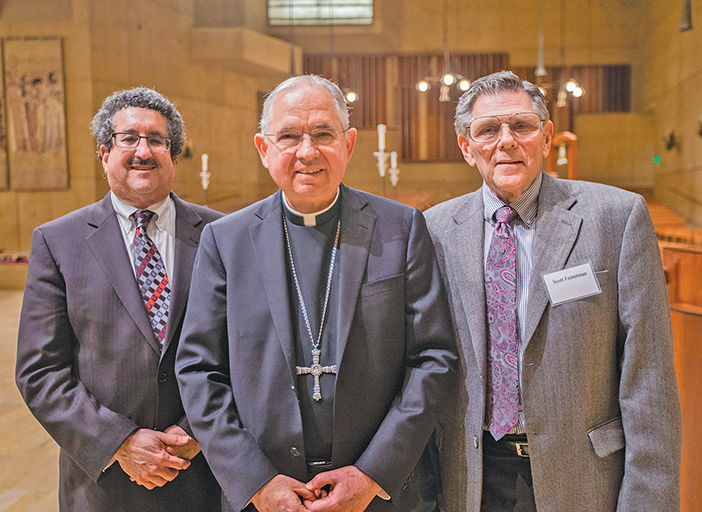We are living in times of rising religious extremism and violence.
As I write, I’ve just read the sad news that 90 Christians have been kidnapped from two villages in Syria. Of course we were all shocked earlier this month by the news that 21 Coptic Christians were executed in Syria — killed, as Pope Francis said, “for the mere fact of being Christians.”
Sadly, we know that Christians are being persecuted every day in the Middle East, Africa and elsewhere in the world.
I was also saddened by the attack earlier this month on a Copenhagen synagogue, and the terror attacks in Paris in January. Authorities tell us that anti-Semitic violence is on the rise sharply throughout the world. So these are troubling times for Christians and Jews, as well as other religious and ethnic minorities.
I’ve been praying and reflecting on these things because in recent weeks I’ve had the opportunity to participate in two important and hopeful events that remind us of the deep spiritual bonds that unite believers of all faiths, but especially Catholics and Jews.
The first event was held at Loyola Marymount University in late January. I had the privilege to take part in a public dialogue with Rabbi Abraham Skorka.
Rabbi Skorka is an Argentinian and a close friend of Pope Francis from his days when he was archbishop of Buenos Aires. The two collaborated on an excellent book, “On Heaven and Earth,” in which they dialogue about the great issues in the world today — from war and peace, to euthanasia, the global economy, poverty, atheism and more.
The pope’s friendship with Rabbi Skorka is a practical example of the “culture of encounter” that the pope is calling us to create in our world today.
As we know, the pope wants all of us, in our ministries and everyday lives, to make new efforts to break down barriers, to try to understand others better and to build friendships — especially with people of other religions and different points of view.
For many years now, the Church has been working to build this culture of encounter with the Jewish people, along with believers from other world religions. These efforts resulted in the historical declaration of the Second Vatican Council, Nostra Aetate (“In Our Time”) on non-Christian religions.
Earlier this month, I took part in a Catholic-Jewish celebration of the 50th anniversary of Nostra Aetate. It was a beautiful service held at the Cathedral and I was privileged to join rabbis and other Jewish and Catholic leaders from Los Angeles and around the country.
While Nostra Aetate discussed our relationships with Muslims, Buddhists, Hindus and other religions, the longest and central section of the document concerns “the bond that spiritually ties” the Church to the Jewish people.
The long journey of Catholics and Jews down through the centuries has been complicated and marked by misunderstandings, conflicts, and sadly, even by violence.
But I believe our friendship, which grows deeper and more profound with each passing year, can be an important witness in these times of religious violence and intolerance.
The friendship that Catholics and Jews continue to forge, through patient dialogue and prayer, is a beautiful witness that historic hatreds and fears can be overcome, that religious differences need not make us enemies or strangers.
Rereading Nostra Aetate, I was struck by this passage:
“We cannot truly call on God, the Father of all, if we refuse to treat in a brotherly way any man, created as he is in the image of God. … The Church reproves, as foreign to the mind of Christ, any discrimination against men or harassment of them because of their race, color, condition of life or religion.”
These words have prophetic force in these times when entire populations are being killed, harassed and persecuted in the name of religion.
In the face of this, Catholics, Jews, Muslims and people of all faiths share a common duty — to stand shoulder to shoulder in rejecting fanaticism and extremism and removing every barrier of prejudice and intolerance. This is the duty that we have as people of faith in our time — to work together to bring healing, peace and blessing to our world.
In our prayers this week, let’s keep praying for each other. And let’s pray in a special way for our Jewish brothers and sisters and the persecuted Church everywhere in our world today.
Let’s ask for the grace to make our own contribution — each in our own way — to the culture of encounter that will bring peace and fellowship to our communities and to our world.
May our Blessed Mother Mary, a daughter of the Jewish people, help all of us to work together to build a world that more and more reflects the will of our Creator.

